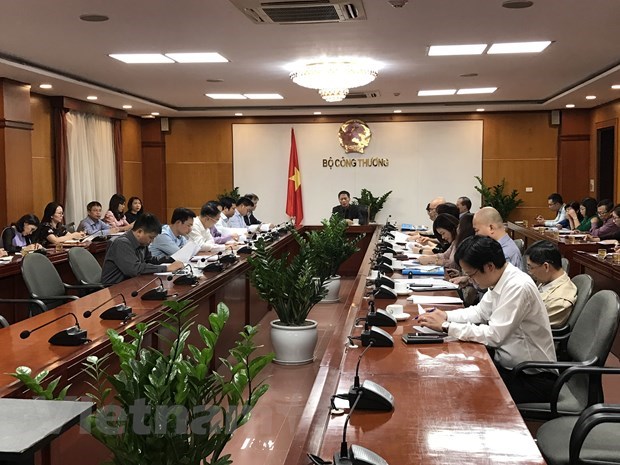Bettering forecast work to effectively cope with COVID-19: minister
Hanoi (VNA) – Minister of Industry and Trade Tran Tuan Anh has urged concerned agencies to better the forecast work, thus putting forth suitable solutions to minimise the impact of the COVID-19 pandemic.
 Minister of Industry and Trade Tran Tuan Anh chairs a meeting seeking solutions to COVID-19 (Photo: VietnamPlus)
Minister of Industry and Trade Tran Tuan Anh chairs a meeting seeking solutions to COVID-19 (Photo: VietnamPlus)
Speaking at a meeting on February 26, Anh said the pandemic is still developing complicatedly globally, which has greatly affected production and businesses activities.
Prolonged COVID-19 would result in disrupted supply chain
Truong Thanh Hoai, Director of the Ministry of Industry and Trade (MoIT)’s Industry Department, said many countries may have supply chains disrupted due to the shortage of spare parts.
[Over 6,500 tonnes of farm produce exported via Lao Cai border gate]
Vietnam is not exceptional, he said, explaining that the domestic processing and manufacturing industries have still largely relied on materials imported from China and the Republic of Korea (RoK).
The electricity and electronics sector, for example, imported about 40 billion USD worth of spare parts in 2019, mostly from China, the RoK and Japan, Hoai added, expressing his concern that many firms in this sector can maintain operation only until mid or late March, 2020 if the pandemic lasts long, affecting the import of components.
The impact of COVID-19 can be felt in other sectors like garment-textiles, and leather-footwear that greatly rely on imported materials.
Vietnam imported 1.32 billion USD worth of yarn, 7.73 billion USD of fabric and about 2.45 billion USD of leather from China last year in service of textile-garment, and leather-footwear production. Around 2.02 billion USD was spent on fabric and 0.71 billion USD on textile-garment and leather-footwear materials from the RoK.
Meanwhile, it is not easy to find alternative supply sources in the short term, with challenges regarding technical requirements, quality and price that may be higher than the price offered by China.
If enterprises have to suspend operation due to material shortage, they will burden expenditures on bank loans, machine maintenance and wage payment for labourers, Hoai said.
The pandemic has also led to lower domestic consumption, with total revenue of retail trade in the first two months of this year growing only over 8 percent, the lowest rate over the past years.
“If the pandemic lasts until the second quarter of this year, the combined retail sales may increase about 10 percent,” according to Tran Duy Dong, Director of the MoIT’s Domestic Market Department.
Bettering forecast work to adopt effective solutions
Currently, China and several other countries like the RoK and Japan are major importers of certain Vietnamese products, especially garment-textiles, leather-footwear, and electronic products and components.
However, the COVID-19 pandemic is forecast to exert negative impacts on exports to these markets.
Hoai said the Industry Department has held working sessions with agencies, associations and major businesses in processing and manufacturing industries to learn about their difficulties, and report them to the ministry and the Government.
To ensure the supply of production materials and spare parts, Hoai proposed the Government take measures encouraging domestic firms to find other sources of materials, and those in support industries to step up production to partially meet the domestic demand.
Ministries and agencies should offer tax incentives and extend short-term loans, while assisting businesses in paying social insurance for labourers who have been rendered jobless due to the epidemic, he said.
Minister Anh also stressed the need to better the forecast work and devise policies to promptly and effectively cope with the pandemic.
It is necessary to count the number of domestic firms joining the global supply chain to assess the impact in each quarter, he said.
The minister also asked concerned agencies to assess the consumption as well as production capacity of industries to roll out solutions to stabilise the domestic market. /.













